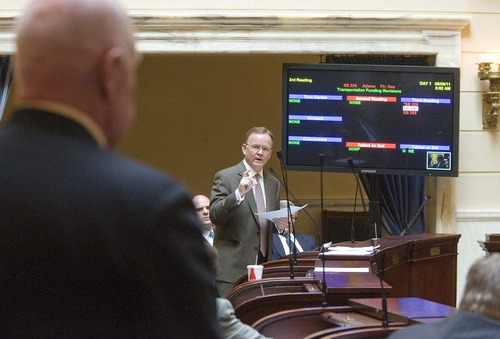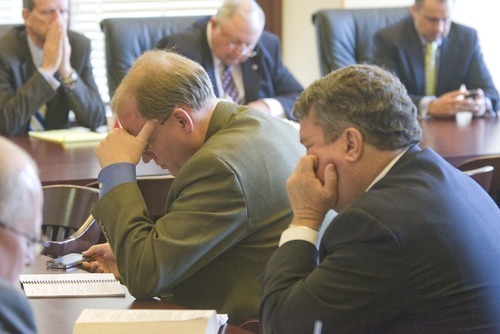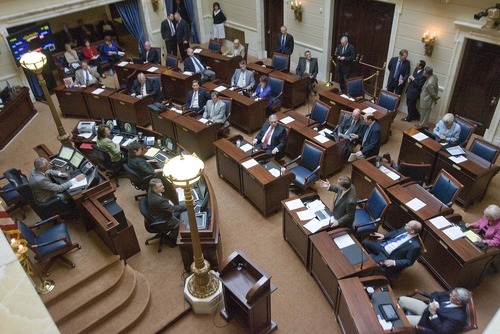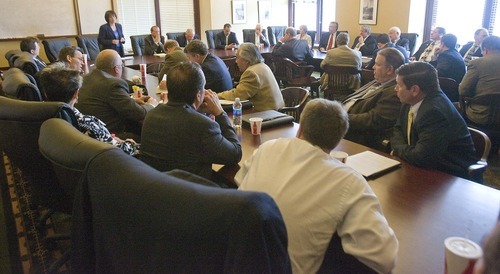This is an archived article that was published on sltrib.com in 2011, and information in the article may be outdated. It is provided only for personal research purposes and may not be reprinted.
Lawmakers rolled Gov. Gary Herbert by overriding his veto of a bill earmarking sales-tax revenues for road projects, and senators unexpectedly plan to come back Saturday to effectively end Utah government's four-day workweek.
It marks just the third time in 15 years the Legislature has overridden a governor's veto, but Herbert said that, despite the setback, he will continue to "stand up for the people" when he thinks the Legislature is wrong.
Kirk Jowers, director of the University of Utah's Hinckley Institute of Politics, said many lawmakers he talked to were uncomfortable with the vote and felt like they were strong-armed into voting for the override.
"I think part of the reason [for the override] was just an executive branch-legislative branch showdown and the legislators wanted to show him who's boss, but I think it might backfire on them," he said. "It seemed perhaps needlessly confrontational for the Legislature to stick this in there."
The House and the Senate defied Herbert's objection and pushed through a bill that would earmark 30 percent of the growth in sales tax revenues for road construction. Herbert had argued the bill, SB229, would tie the hands of legislators and elevate roads above all other state funding.
"Today's biggest loser is education," Herbert said in a statement. "[Earmarking funds] is a bad way to allocate our very limited state resources. … Economic tides can turn quickly and the State of Utah must be fiscally agile to safeguard both our priorities and our resources. The battle for education funding is not over."
Lawmakers argued that they are not hamstringing future legislatures. They still could dip into the transportation fund if the money is needed, they said, and pointed out they have tapped other transportation funds in the past.
"To me this is not binding earmarking at all. This is setting a budgetary goal, and I think that's appropriate," said Sen. Howard Stephenson, R-Draper. "I feel strongly we need to provide the financial commitment to take care of our highway needs."
Sen. John Valentine, R-Orem, argued that in recent years the Legislature has been reserving more and more money for various projects to the point that $326 million was earmarked during the past legislative session.
"If we continue to grow earmarks in this state," Valentine said, "we will not be able to perform our constitutional duty, and the governor will not be able to do a budget recommendation."
But lawmakers aren't done.
Senate Republicans were a few votes shy of being able to override the governor's veto of a bill that would have required state agencies to be accessible five days a week, changing from the four, 10-hour days that most state employees have worked since 2008.
Sen. Pat Jones, D-Holladay, had decided not to support the override, Sen. Stuart Reid, R-Ogden, had left for a wedding, and Sen. Curt Bramble, R-Provo, was attending a National Conference of State Legislatures meeting in Boston.
So Senate leaders decided to recess until Saturday night — which happens to be Herbert's birthday — and return to the Capitol when Bramble and Reid can attend and they will have the votes to override the veto.
The extra day at the Capitol will cost taxpayers about $7,100.
The support for overriding the workweek bill came as a shock, even to legislative leaders, who had told the governor they didn't plan to consider it.
"It wasn't by any means preconceived or pre-planned or anything. It was just a groundswell," said House Speaker Becky Lockhart. "Nobody expected this to happen, and I don't think there was anybody who was working it."
But during an early-morning House Republican caucus, Rep. Mike Noel, R-Kanab, persuaded colleagues to let his four-day workweek bill get a vote and, with the support of a number of Democrats, it received the 50 votes needed.
Herbert said he was surprised Noel pushed for an override, believing he had struck an agreement with the sponsor not to push for an override, in exchange for an executive order directing agencies to find ways to provide services on Fridays.
The governor said it will cost more than $800,000 to make the change, but the Legislature hasn't provided any funding.
Senate Minority Leader Ross Romero, D-Salt Lake City, said legislative leaders were springing the bill on lawmakers after indicating it wouldn't be voted on.
"For whatever reason there is this perceived urgency to get this bill through and I just don't see it," said Romero. "Now, because there aren't sufficient votes to pass the bill, we're being asked to come back another day. I lay the additional expense squarely at the feet of the Republicans and their desire to move forward."
Opponents of the four-day experiment argued the public is inconvenienced when state offices are closed and that it is unconstitutional.
Gov. Jon Huntsman Jr. issued an executive order in August 2008 changing the schedule of most state workers to four 10-hour days on a one-year trial basis. He estimated there would be $3 million in savings, but the actual savings ended up much smaller — about $1 million, according to a legislative audit.
Still, a poll conducted by the state also showed that the public and state workers liked the four-day workweek, and Herbert decided to stick with the revised schedule. But several opponents argued they had heard from constituents that it is inconvenient to have offices closed on Fridays and any hassles to state workers should be secondary.
"It affects the image of government and the image of the Legislature and everyone in general associated with the state to have those employees not working like regular people do in 40-hour workweeks," said Rep. Mel Brown, R-Coalville.









